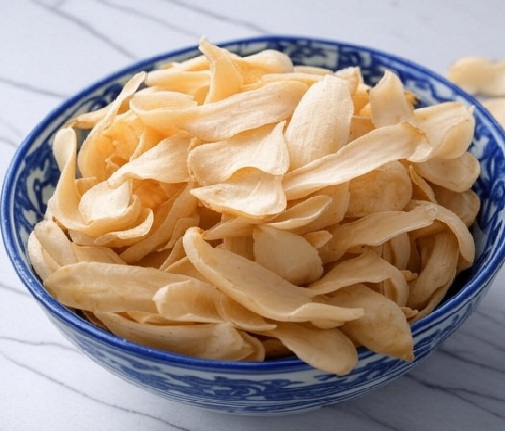Lily Bulb Chinese Herb

Lily Bulb (Bai He): A Gentle Herb for Lungs, Emotions, and Yin Nourishment
Introduction
Lily bulb, known as Bai He (百合) in Traditional Chinese Medicine (TCM), is a delicately sweet and nourishing herb used to moisten the lungs, calm the spirit, and replenish yin. Prized for its ability to soothe dry coughs, ease anxiety, and support emotional balance, Bai He is commonly used in both culinary and medicinal contexts. It is especially helpful for those recovering from illness, emotional strain, or long-standing dryness.
What Is Lily Bulb?
Bai He refers to the fleshy, white bulb of the Lilium plant, typically from species like Lilium brownii or Lilium lancifolium. In TCM, it is classified as sweet, slightly bitter, and slightly cold, and it enters the Lung and Heart meridians. Traditionally, lily bulb is used to moisten the lungs, clear heat, nourish yin, and calm the mind. It is often included in gentle tonics and food therapy for people recovering from fevers, chronic cough, or emotional stress.
Health Benefits of Lily Bulb
Moistens the Lungs and Eases Dry Cough
Bai He helps relieve chronic, dry coughs or throat irritation caused by Lung yin deficiency, dryness, or post-illness recovery.
Calms the Spirit and Eases Anxiety
Lily bulb is especially known for its ability to soothe restlessness, insomnia, or emotional upset related to Heart or Lung imbalances.
Nourishes Yin and Clears Heat
It gently replenishes fluids and reduces internal heat, especially in individuals with signs of dryness, night sweats, or low-grade fevers.
Promotes Emotional Stability
Used in formulas to support mental clarity, reduce agitation, and promote peace of mind in those dealing with grief or sadness.
Supports Skin and Throat Hydration
Its moistening properties benefit the skin and mucous membranes, especially in dry or windy climates.
How to Use Lily Bulb
In Soups and Herbal Desserts
Use 10–15 grams of dried lily bulb in soups or sweet herbal broths with goji berries, red dates, white fungus, or pear. Simmer 30–60 minutes.
In Teas or Lung Tonics
Brew with herbs like chrysanthemum, licorice, or mulberry leaf to soothe the throat and calm the lungs. Drink warm.
As a Culinary Ingredient
Fresh or dried lily bulb can be added to congee, stir-fries, or steamed desserts to support yin and create emotionally soothing meals.
Where to Buy Lily Bulb
You can find Bai He at the following places:
- Chinese herbal medicine shops
- Asian grocery stores (fresh or dried section)
- Online retailers such as Amazon, iHerb, or TCM food suppliers
Look for:
- Ivory-colored, slightly curved petals if dried
- Soft, moist bulbs if fresh
- Sulfur-free and pesticide-free labeling
Are There Any Side Effects?
Lily bulb is very safe and gentle for most people. Because it is slightly cooling, individuals with cold digestion or loose stools should use it in moderation. It is not known to cause adverse effects and can be consumed long-term when prepared properly.
Conclusion
Lily bulb, or Bai He, is a soothing yin tonic in TCM that supports lung health, emotional peace, and gentle recovery from dryness or stress. Whether simmered into soups or enjoyed in teas, this graceful herb offers nourishment for both body and spirit.
FAQs
Can I eat lily bulb every day?
Yes, it can be consumed regularly in small amounts for lung and emotional support, especially in soups or teas.
What does lily bulb taste like?
It has a sweet, slightly starchy flavor with a silky texture when cooked.
Is lily bulb safe for children?
Yes, it is often used in pediatric tonics to relieve dry cough, anxiety, or sleep disturbances.

